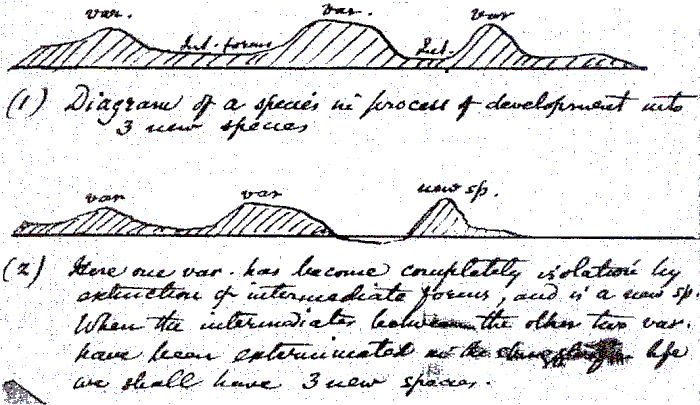|
Russel Wallace : Alfred Russell Wallace (sic)
My dear Mr. Bernard I return your documents having just finished reading your "Introduction". What strikes me most is that your final proposals are exceedingly modest as compared with the vigour of your preliminary denunciations. I can quite understand that in the lower forms of life you are working at, and with the imperfect materials at your command, the attempt to define species may be hopeless and it may be because nature has in most cases not yet defined them. But with the higher vertebrates and insects with which alone I have any intimate acquaintance the difficulty rarely arises, because at least . . . tently [illegible] perhaps 99/100 of species have been clearly defined by nature herself. Neither do I see much difficulty in giving a clear definition of "species" on the principles of evolution. People sometimes say to me--"How can you as a Darwinian believe in 'species'. There are no such things". But as a Darwinian I have the clearest idea of what a species is, and I enclose my definition. It is one which works very well, because the numbers of well marked, and at first sight good species, which yet show a complete transition to other species, are very few indeed compared with the very large number which show no such transition. A few criticisms of details are--Why "fanciful names" often repeated as if it were the characteristic of sp. names. Surely the majority are, and all ought to be, descriptive or appropriate. p. 12. All this very good, but I would add--"All these unnamed forms to be indicated by letters (a) (b) (c) &c. for easy reference". p. 13, 1.3. after "new" add "if very imperfectly known". p. 13. for the word "cumulative" would not "developing" or growing be better, especially as you use "adult" in the same connection. Your proposals are I think excellent for all imperfect materials or lowly organised groups--but among the higher animals a species may often be safely named as new from one or two specimens only--as when a distinct fruit-pigeon or parrot is found on a new island, the fauna of all the surrounding lands being well known. When you come to Southampton on Sat. Dec. 8th, will you not come on to us. We will gladly give you a bed, and we shall be glad to hear your S. African experiences. Kind regards to F. O. P. C.--"the comrade" as we call him here. Yours very faithfully, P.S. Do you know any rich man who will help to form an advanced Colony in a lovely district near London, "The Chiltern Hills." I have found an old house there I want, with an estate of 230 acres suitable for a dozen good houses. If so please send address at once. A. R. W.
A species is a group of individuals which reproduce their like within definite limits of variation, and which are not connected with their nearest allied species by insensible variations. Note. The above definition is mainly a statement of fact, founded on the theory of evolution by natural selection; and may be illustrated by the following diagrams.
(1) Diagram of a species in process of development into 3 new species (2) Here one var. has become completely isolated by extinction of intermediate forms, and is a new sp. When the intermediates between the other two var. have been exterminated in the struggle for life we shall have 3 new species.
Copyright: Alfred Russel Wallace Literary Estate. |

